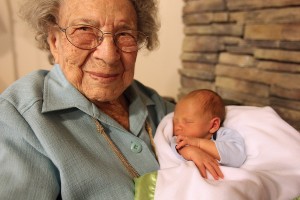BUHL • She turned 18 the year women won the right to vote. She was already a senior citizen when man first stepped foot on the moon.
Meet Helene Byrne, Magic Valley's 109-year-old.
I had the chance to visit with the centenarian recently at Evergreen Place Assisted Living in Buhl, and I was determined to come away from our meeting a wiser person.
On my way to meet Helene, Ipictured myself leaning in as she whispered great truths into my ear. I saw myself scrawling down her sage advice, then leaving the assisted living center holding tight to Yoda-like nuggets of pure wisdom.
Turns out, Helene isn't the pontificating sort. Her daughter, Shirley Anderson, 77, tried to explain this to me before Ishowed up.
And sure enough, Icouldn't even get out the words before Helene started to laugh.
"Do you have any advice ...," Ibegan, as she shook her head and laughed, "... about living a long life?"
It must be a question she hears a lot.
"Idon't know," Helene said in her slow, friendly but tired-sounding voice as she sat in a soft chair in a patch of light near a window in her bedroom. "Just live around good people, I guess."
When asked for her life philosophy, advice or the type of aha moments that take 100 years to develop, she acts as if she's not necessarily qualified to respond. She's just a person, like you or me, still curious about the world around her. Only, she's been curious a lot longer.
These days, most of the people Helene has known are gone. She spends much of her day gazing out windows. She still loves candy, especially chocolate. She enjoys car rides and reading and is halfway through the book "The Secret Garden."
"I've read it before,"she said. "I'm re-reading it."
Helene's favorite childhood memories revolve around playing outside in Harrison, where she was raised. She'd go sledding and ice-skating, and a few times during our 30-minute chat, she told me about her favorite tree branch.
"We had a hill behind our house," Helene said, "and Iloved to climb the hill. And there was a branch that went out like that," she said, stretching out her arm, "and we'd get out on that big old limb and play."
As she told me again about her favorite play spot, I wondered what memory will become my "tree branch," the image that will stick in my head when I'm old. I guess that's not the type of thing you can predict.
As for Shirley, she might be in for a long run herself. Her father, Lloyd Byrne, Helene's late husband, died at 95 in 1993. Shirley is closing in on 80, but you'd swear she was 60. She's not hoping to live to a certain age. "I'm just trying to enjoy each day as it comes,"she said.
Living well into the triple digits isn't necessarily a blessing. You watch everyone you've ever known, except perhaps your descendents, die.
"I think living too long is almost as sad as dying too young," Shirley told me. "Because, like the Bible says, there is a time to be born and a time to die."
Helene's time isn't here just yet.
If she stays healthy, the longtime Buhl resident and onetime winner of the city's Woman of the Year honor will on Sept. 12 become a "supercentenarian," a person 110 or older. At the 2010 census, Idaho had only one supercentenarian (a woman) and 13 people ages 105 to 109 (11 women and two men). Of the Gem State's total population of 1,567,582, just 220 were at least 100 years old at the time of the census.
I asked Helene whether she wanted to become the oldest person on record. It would require beating out Jeanne Calment, a French woman, who died in 1997. According to the Guinness Book of World Records, Calment lived for 122 years and 164 days. Helene is a mere 13 years away.
Her answer was typical of the person she has proven herself to be — which, according to her daughter, is someone who stays positive, rolls with the punches and just keeps on keepin' on.
"It'll just happen, Iguess,"Helene said, mulling it over. "Maybe so, I don't know. I'll live and I'll see."
Would she want to live another 13 years?
"If I felt well,"she said, "and feel as good as I do now, yes."
The mother of two daughters in their late 70s is surprisingly healthy. She can't hear well and has some arthritis, but that's the extent of her medical problems.
Helene doesn't know why she's lived so long. "Lucky" is how she describes it.
"Ithink she wonders why she's been left alive," Shirley said. "I'll bring it up, and she'll kind of smile and say, 'I guess it's just the way it is.' She has no idea why she's been allowed to live so long with such good health."
She simply doesn't know. That's my nugget.
When a young journalist showed up looking for answers about life and aging, Helene doled out a century of wisdom, telling me, in so many words: No matter how old you get, your questions outnumber your answers.







